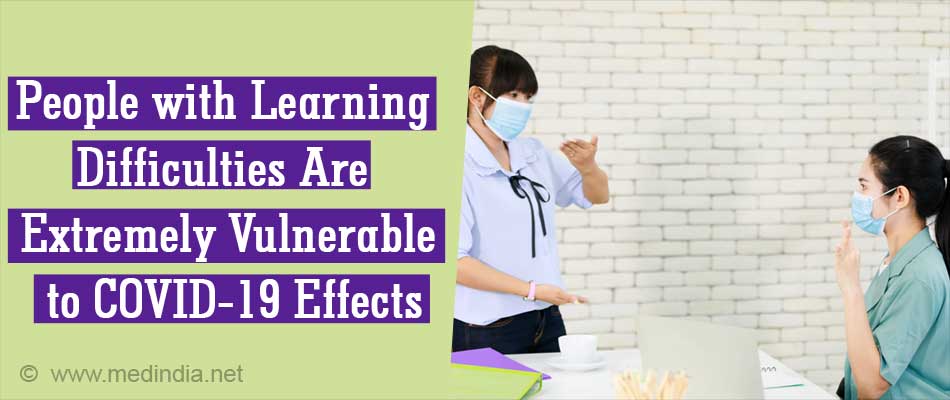Though emerging evidence shows that people with a learning disability are at higher risk from
related death than the general population, the results are often complicated by factors such as deprivation and underlying conditions (comorbidities).
As many people with disabilities have pre-existing health conditions that make them more susceptible to contracting the virus and also leading to elevated death rate among them.
A lack of clarity still exists in the increased COVID-19 death risk among people with a milder learning disability.
New Evidence
To explore this further, the UK researchers investigated the risk of covid-19related hospital admissions and death among children and adults with learning disabilities in England compared to the general population.
Their results are based on electronic health records linked to hospital admission and mortality data for more than 17 million people registered with a general practice in England.
Data for 14,312,023 adults and 2,627,018 children were analyzed across both waves of the COVID-19 pandemic: wave 1 (registered with general practice as of 1 March 2020 and followed until 31 August 2020); and wave 2 (registered 1 September 2020 and followed until 8 February 2021).
Among 90, 307 adults registered as learning disability, 538 (0.6%) had a covid-19 related hospital admission; there were 222 (0.25%) COVID-19 related deaths and 602 (0.7%) non-COVID-19 deaths.
Among adults without learning disability, 29,781 (0.2%) had a COVID-19 related hospital admission; there were 13,737 (0.1%) COVID-19 related deaths and 69,837 (0.5%) non-COVID-19 deaths.
The results show that adults registered with learning disabilities have 5-fold higher risk of COVID-19 related hospital admission and 8-fold higher risk of COVID-19 related death than adults not on the register.
After considering potentially influential factors, such as age, sex, ethnicity, and geographical location, higher rates were among those with a severe learning disability than those with a milder learning disability and in residential care.
Similar patterns were seen for children, but the authors stress that absolute risks of covid-19 hospital admission and death among children were less.
Apart from these observational findings, some limitations like focusing only on severe covid-19 outcomes and not able to identify everyone with a learning disability from medical records alone. These results were consistent even after further analyses suggesting that they are strong findings.
The gaps in learning disability registers shown in this study suggest that it may limit the reach of the vaccination programme, so prompting a call for greater efforts to update and maintain accurate registers so that all eligible individuals can benefit.
The efforts need to be continued to protect people with learning disabilities from COVID-19 adverse outcomes, and more research is required to know about the excess covid-19 risks among people with Down’s syndrome and cerebral palsy.
This study makes an important contribution to the evidence on how COVID-19 pandemic affected this vulnerable group.
Call for Action
The concerning attitudes and discrimination towards the value of the lives of people with learning disabilities raised during the COVID-19 pandemic.
The COVID-19 vaccination programme also disadvantaged people with learning disabilities, so we must prioritize people according to age rather than the severity of comorbid disorders.
We must make investments in research that help us to understand the risks faced by people with learning disabilities and protective measures from the high risks of hospital admission and death from COVID-19.
People with learning disabilities have the same rights as everyone else, including the right to good health and safe from harm.
Next Step
During the COVID-19 pandemic, people with disabilities who are dependent on their family support may find themselves isolated and unable to survive due to the lockdown measures.
Those living in institutions are more vulnerable as evidenced by the overwhelming numbers of deaths in residential care homes and psychiatric facilities.
Barriers for people with disabilities in accessing health services and information are intensified. They also face discrimination in accessing livelihood, participating in online forms of education, and seeking protection from violence.
Things to do to avoid this:
- Awareness about the COVID-19 pandemic’s impact on persons with disabilities and their rights
- Draw attention to promising practices already being undertaken around the world
- Help government to identify the key actions
- Provide resources to learn about ensuring rights based COVID-19 responses inclusive of persons with disabilities.
Support people with learning disabilities during COVID-19 pandemic:
- Help them to understand the changes
- Infection control and good personal hygiene
- Prioritize healthcare facilities
References:
- Learning disability – The impact of COVID-19
– (https://www.local.gov.uk/learning-disability-impact-covid-19) - People with Disabilities
– (https://www.cdc.gov/coronavirus/2019-ncov/need-extra-precautions/people-with-disabilities.html) - Covid 19: People with learning disabilities are highly vulnerable
– (https://www.bmj.com/content/374/bmj.n1701) - – ()
Source: Medindia



